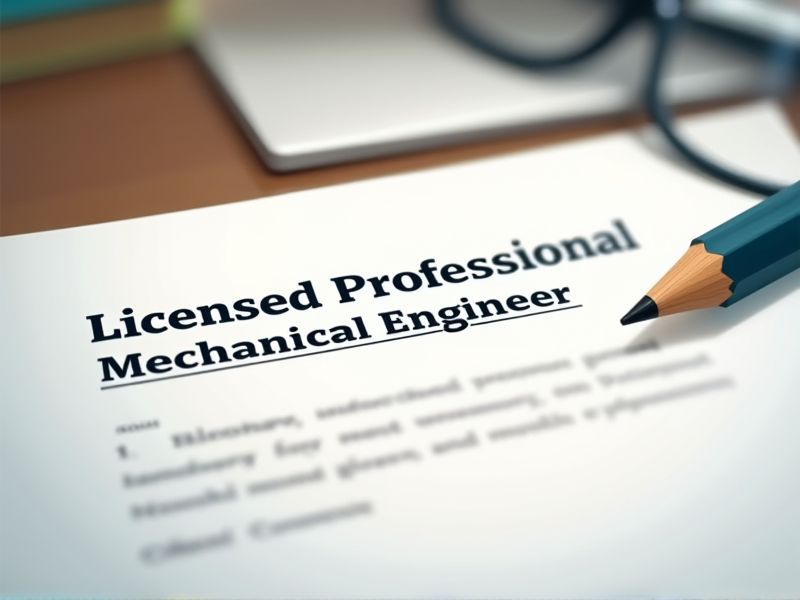
Strong technical qualifications in a Licensed Professional Mechanical Engineer are often necessitated by industry demands for specialized knowledge. Certain certifications ensure engineers possess the skills to address complex engineering challenges efficiently. Certifications also provide credibility and enhance career advancement opportunities in competitive industries. Here are some important certifications you may need for a Licensed Professional Mechanical Engineer.
Professional Engineer (PE) License in Mechanical Engineering
Obtaining a Professional Engineer (PE) license in mechanical engineering demonstrates a high level of competency and ensures the engineer can be trusted with public safety and welfare responsibilities. The license is legally required to approve and stamp engineering plans, which is crucial for construction and public project approvals. Liability protection for engineers and their employers is enhanced because they abide by industry standards and regulations. Career prospects and earning potential often improve as employers recognize the importance of a PE for pivotal leadership roles.
Fundamentals of Engineering (FE) Certification
The FE certification serves as a prerequisite step in achieving licensure, ensuring engineers possess a foundational understanding of engineering principles. By earning the FE certification, engineers demonstrate their commitment to professional standards and competency in their field. Employers often view the FE certification as an indicator of a candidate's dedication and technical aptitude, increasing job prospects. A licensed professional mechanical engineer with FE certification is better equipped to tackle complex engineering challenges, enhancing public safety and project reliability.
LEED Accredited Professional (LEED AP)
Having a LEED Accredited Professional (LEED AP) credential complements a Licensed Professional Mechanical Engineer's expertise by adding sustainable design proficiency. This qualification aids engineers in effectively integrating energy-efficient systems within buildings, leading to reduced operational costs and environmental impact. Clients increasingly demand green certifications for their projects, and a LEED AP can ensure compliance with these requirements. Possessing this credential enhances the engineer's competitiveness in the marketplace by aligning with global sustainability standards.
Certified Energy Manager (CEM)
A Certified Energy Manager enhances a mechanical engineer's capability to implement energy-efficient systems, providing a competitive edge in sustainable design. CEM credentials signify a deeper understanding of energy conservation technologies, which is critical in reducing operational costs. This expertise aids mechanics in meeting stringent environmental regulations, a growing priority in engineering projects. In integrating CEM knowledge, engineers can optimize building systems for improved performance, increasing the demand for their services.
ASHRAE Certification (e.g., Building Energy Modeling, HVAC Design)
ASHRAE Certification enhances a licensed professional mechanical engineer's credibility in specialized fields like building energy modeling and HVAC design. It often leads to increased job opportunities as employers recognize the technical expertise and updated knowledge it represents. The certification process promotes mastery of industry standards, which can improve project outcomes and efficiency. Engineers with ASHRAE Certification are more equipped to address modern sustainability challenges, aligning with the growing focus on energy-efficient buildings.
Certified Reliability Engineer (CRE)
Certified Reliability Engineers (CRE) provide specialized expertise in assessing and improving the reliability of mechanical systems, which enhances the overall performance and lifespan of engineering projects. Their knowledge in reliability engineering principles helps Licensed Professional Mechanical Engineers in designing systems that minimize failure risks and maintenance costs. CREs contribute to rigorous data analysis to predict potential system failures, which informs better decision-making for project planning and resource allocation. Their insights are crucial for ensuring compliance with industry standards, which is vital for maintaining quality and safety benchmarks in engineering practices.
Project Management Professional (PMP)
Earning a Project Management Professional (PMP) certification enhances a Licensed Professional Mechanical Engineer's ability to lead projects more effectively by providing structured methodologies and best practices. The certification can lead to an increased salary, as PMP holders often earn higher compensation due to their demonstrated project management skills. It improves collaboration and communication within engineering teams, ensuring projects are completed on time and within budget. Employers often view PMP certification as a significant asset, increasing the engineer's competitiveness in the job market.
Six Sigma Certification (Green Belt or Black Belt)
Six Sigma Certification enhances a licensed professional mechanical engineer's ability to implement quality control and process improvement effectively. Achieving Green Belt or Black Belt status equips them with methodological skills to reduce defects and inefficiencies, leading to cost savings. Employers value these certifications for ensuring comprehensive project success and boosting engineers' competitive advantage. Mechanical engineers with Six Sigma Certification can better meet industry standards, enhancing their career growth.
Certified Facility Manager (CFM)
A Licensed Professional Mechanical Engineer benefits from having a Certified Facility Manager on the team because CFMs ensure the operational efficiency and cost-effectiveness of building systems. Their expertise in facility management leads to better integration of mechanical designs with building operations, reducing risks and maintenance issues. The collaboration between CFMs and engineers helps in optimizing energy use and achieving sustainability goals. This combined expertise enhances the overall quality and reliability of facilities, benefiting stakeholders and clients alike.
OSHA 30-Hour Construction Safety Certification
The OSHA 30-Hour Construction Safety Certification enhances a mechanical engineer's awareness of safety standards, directly contributing to reduced workplace accidents. Comprehensive safety training can lead to improved project outcomes, as engineers can better identify and mitigate potential hazards. Regulatory environments often demand such certifications to ensure all personnel are aligned with national safety expectations. Possession of this certification can boost an engineer's credibility, signaling to clients and employers a strong commitment to maintaining a secure working environment.
Summary
When you, as a Licensed Professional Mechanical Engineer, obtain additional certifications, you enhance your specialized skills and knowledge. This expansion of expertise often results in increased job opportunities and potential for career advancement. Employers may recognize your advanced credentials with higher salaries and leadership roles. Your professional credibility is strengthened, making you more competitive in the job market.
